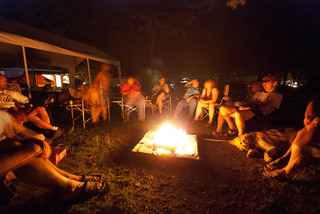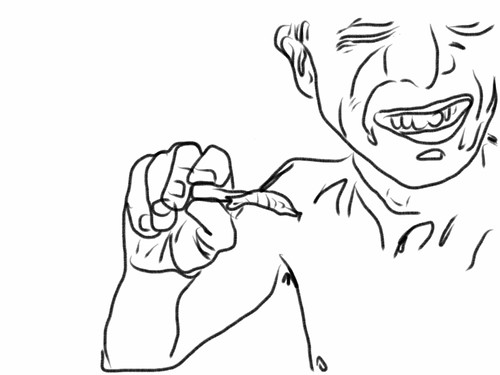
Daily Create 143: Look up today and make a photo that favors what’s going on in the sky. (Taken with Instagram at Mary Washington Bell Tower)

Daily Create 143: Look up today and make a photo that favors what’s going on in the sky. (Taken with Instagram at Mary Washington Bell Tower)
I had a chance to meet Bryan Alexander at the NITLE Symposium this past April – he’s a dynamic thinker and collaborator, for sure. Up to that point, he’d been mentioned in conversations about storytelling, open access, and technology in liberal education. In conversations last semester, Alexander was mentioned as part of our digital humanities definition discussions and early conversations about digital storytelling as a learning tool.
Reading the excerpt from his book provided a window into how collaborative and social web tools can be used to illustrate stories, composition, thinking, and learning (not to mention the geekie brand of fun we all seem to enjoy). No sense in rehashing what was written in the excerpt or on the rest of Bryan’s website. You should explore that on your own. However, some key points, that I gleaned from the reading and reviewing.
The chapter defined and explained uses for various collaborative web tools like blogs, wikis, Twitter, etc. Alexander took the time to give examples of use that clearly show how people can engage high levels of learning. Something we all would like to see happening in our classes. But how?
Take a look at a lot of the learning happening in classrooms around the country. It is a lean back, consume, regurgitate experience. We are fed the information from a variety of sources, left to process it on our own, and output something similar to what was put in (i.e.: lecture and reading to PowerPoint presentation). No doubt there is learning taking place but we’re often left wanting for more both as a learner and as a teacher/faculty member.
 |
| CC BY-NC-SA: We are CS via Flickr |
Enter storytelling; more like re-enter. For centuries humans have shared stories, passed down knowledge, and created new knowledge through stories. We identify with a story and it helps us process complex events, ideas, and concepts.
Alexander suggested that we take this concept and apply it to the collaborative web or Web 2.0 (if you prefer) and challenge our own learning by processing ideas and concepts through a storyline instead of rote memorization and regurgitation.
Alexander provides an example of using a blog (a time-stamped journal on the Internet) as vehicle to re-tell the story of Dracula. Which is a series of letters that are sent and read over a period of time.
Taking Dracula as the example of using a collaborative tool to tell a story, readers can now engage the ideas and story over time as readers, but also comment, share ideas and commentary, or take the topic to a higher level and create a side story that links (freely and openly) to the main blog. Now you’ve got learners doing more than sitting back with a good book; you’ve got them leaning in with a good experience.
The collaborative web provides easy, inexpensive, and interesting ways to engage learning. How about we take science course, a elementary chemistry course, and layer in some storytelling, as an example? No doubt chemistry students need to learn equations and symbols but rather than it be a lean back absorption let’s lean our students forward and get them telling a story about the equations and reactions. Check out Periodic Videos website and see what I mean. Could we have students taking apart an equation from the work, telling a story about the chemicals, reactions, applications, or examples to help them process the information at a higher level of Bloom’s taxonomy? What then could be done if they had a higher level of understanding? Could we then back up and re-approach the equation task?
Why limit ourselves to formal (or informal) education environments? Let’s take a look at how people learn in the workplace. Could we use tools like blogs, videos, wikis, and audio to create stories for new employee orientations or new processes/products/services? A while back I wrote up a literature review about just this subject applied to Millennials – could we use the collaborative web to impact workplace training? Why not extend that further to storytelling via the collaborative web for the benefit and learning of post-graduation learners? Here’s an unedited draft.
All we’re really talking about is a centuries old technique re-imagined with Web 2.0/collaborative tools. If you prefer a more academic description – socially constructivist learning via collaborative Internet technologies.
I’d be remiss if I didn’t link you directly to Bryan Alexander’s book – The New Digital Storytelling: Creating Narratives with New Media so you can buy it and find your storytelling.
Curiosity killing cats and all, what other storytelling books do you find useful?
Listening to Vonnegut, who could arguably be called the father (or one of the fathers) of postmodern literature, discuss dropping shapes into a computer to create stories is beautifully ironic as his work is anything but formulaic. Nonetheless, he’s right. Stories are made up of fundamental (read: ancient; timeless; played; spent?–I hope not.) human experiences. The trick isn’t discovering what those experiences are–we all live them and know them–or to come up with a “novel” set of circumstances that house that experience, but rather to find a (not the) objective correlative for that experience…the holy grail of storytelling. It’s that last part that computers can’t do. So, without further ado, I give you the Objective Correlative Machine acting upon one of my least favorite novels: Moby Dick.
Welcome to WordPress. This is your first post. Edit or delete it, then start blogging!
Daily Create 142: Annoying noise: Record a sound that sets your teeth on edge.
Dear family,
My first week of camp was awesome! I got to share with everyone one of our cool family stories and I got to hear about some other campers families. It was a good ”get to know you” activity. I am still trying to learn the routines at camp, but I am getting there! We had a surprise guest come visit us at camp and explain what direction he would like our camp to head towards, his name was Michael Wesch. By direction I mean that I think this camp is going to teach us how to become more fluent in different multimedia forms. I was inspired by the passion he seemed to hold for the possibilities the internet and multimedia can have with connecting people around the world together.
Listening to Michael Wesch talk I started thinking about my own experiences thus far with the web and multimedia. I realized that I have this awesome tool with unlimited possibilities and I barely know how to use it. I can use the web and multimedia for more then just keeping up with old friends, I can express my ideas through different media outlets to people all across the world.
If you can’t tell, I am really excited about camp and all of the different things I am going to learn! I know by the end of camp that I will be able to utilize the web and all the different multimedia outlets to really communicate effectively with others and hopefully become a part of a global community and help others to join as well.
Well I think it is time for lights out. Write to you again soon!
Ciara
p.s. I was not quite sure how our camp sends ”mail” so hopefully this gets to you!
Week 2 at Camp Magic MacGuffin and The Daily Create has us revealing what sounds drive us batty. For me, particularly, this is really more about revealing neurosis than a slight irritation.
For as long as I can remember, certain repetitious and rhythmic sounds drive me completely bonkers. My wife is convinced that this might be a symptom of deeper and darker problems (not really….I think). Here’s a quick list:
A little behind moving my stuff into camp this week and will play a little catchup with my Family Legend – it’s coming.
I did manage to get the Camp Magic Macguffin PA system hooked up and plugged into my stereo last week and managed to pop in a cassette to make a recording.

Camp Magic Macguffin PA System: Week 1 Clips
This letter is late because I enjoyed my Memorial Day weekend free of distraction and thinking. This was a boon to my sense of normalcy but disruptive to my dissertating and ongoing learning. So, let’s recap Week One at Camp Magic MacGuffin.
Daily Creates
Jumping into the work I completed a few Daily Creates. I love this quick project list, a lot, it allows me to get in and get out quickly and with more energy. The Google Hangout Campfire this week held to take aways for me about the Daily Create:
Mike Wesch
I watched the Mike Wesch video and it wasn’t anything terribly surprising. What we’re finding is that social media and instructional technology in general can foster a lean forward/collaborative learning experience for students and teachers. Too many saddle instructional tech and social media with a disconnection between faculty and students. These videos, however, showed that when used correctly, wrapped with the right instructional design, and focused on socially constructing knowledge instructional technologies can propel learning and connection forward.
Throughout the videos I reminisced about a similar point made by Ze Frank at a recent TED conference.
Dear Family,
The first week at camp has been exciting and sometimes scary. (There’s a guy here named Hatchet Jack. Seriously, you did investigate the reputation of this camp before you sent me, right?)
So far I’ve done two arts and crafts workshops: one where I told the story of my dad and the lion and another where I traced a photo of Christopher’s face.

We also sat around the campfire getting to know each other—it was awkward since it was the first time we were all really together, and then the smoke made it hard to see the faces of the other campers…
Oh, do you remember Mike Wesch, the guy I was raving about last year? He was here! Although the presentation was the same as the one I’d already seen, it wasn’t any less enjoyable. When I’m home I’m too often reminded of the resistance encountered in the university setting to any REAL change that reflects the reality of how we access, use, manipulate, consume, control, and create information, so it’s nice to be reminded that there are people out there exploring new approaches. Too often innovation in the classroom is limited to the mere inclusion of technology; students access written documents, submit written assignments and check their grades online, none of which acknowledges the shift in power that has taken place. Students know the power structure has shifted; instructors can no longer be the keepers of knowledge meting out parcels of information when, how, and to whom they see fit. Instead they need to take on the role of mediator. Mike Wesch understands this.
I’ll write more next week.
A